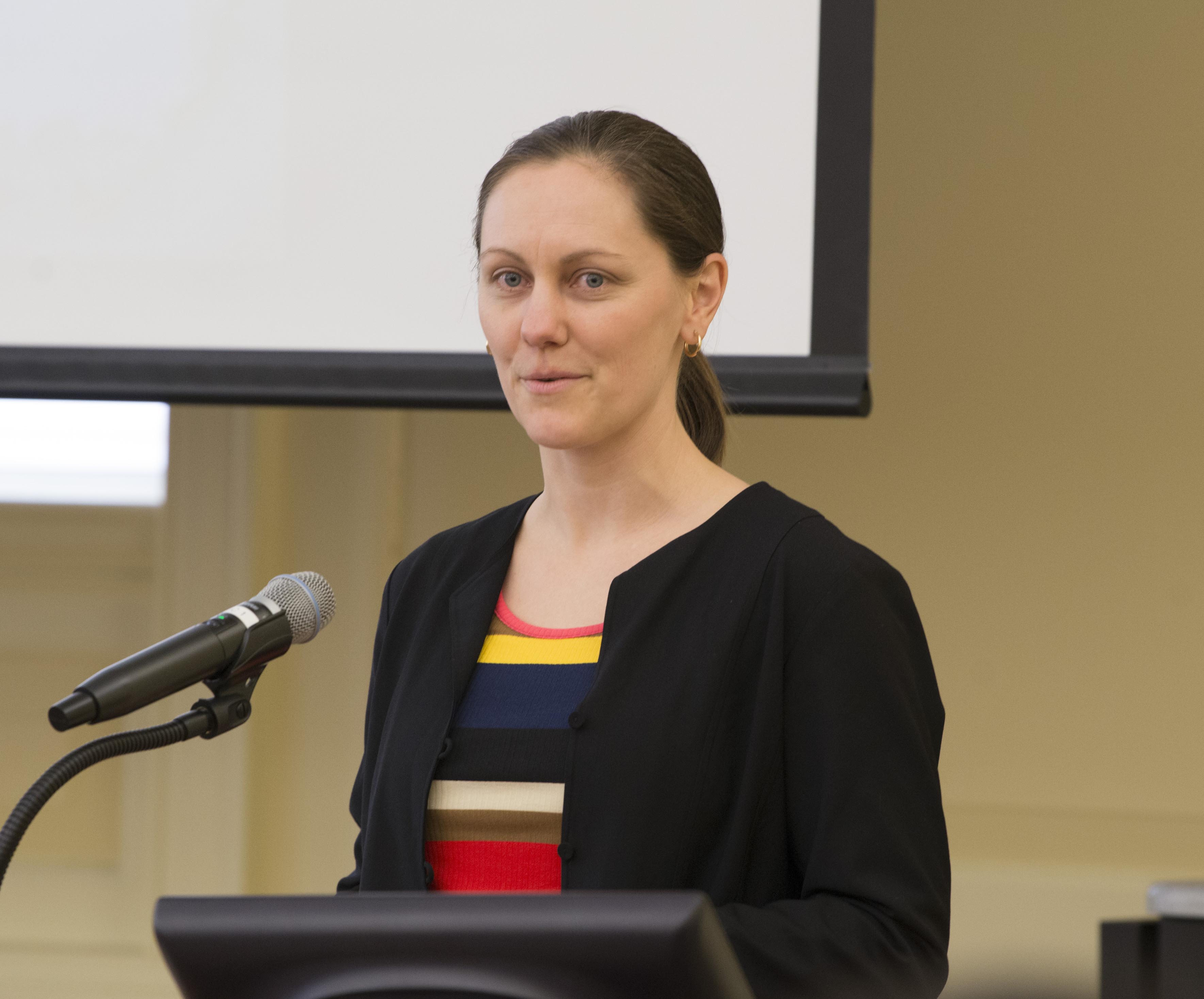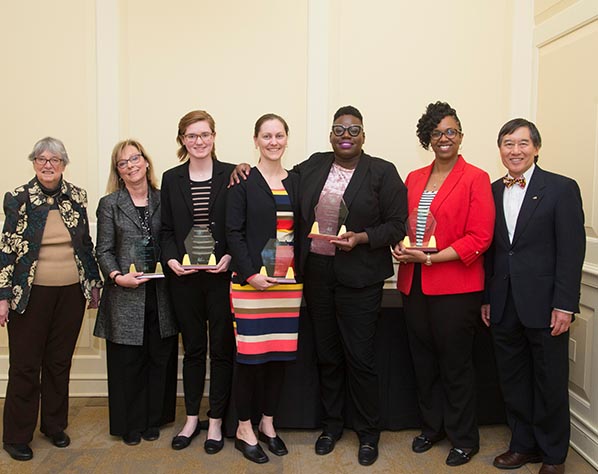- Details
-
Category: Research News
-
Published: Thursday, May 10 2018 10:46
Earth’s magnetic field provides an invisible but crucial barrier that protects Earth from the solar wind—a stream of charged particles launched from the sun’s outer layers. The protective properties of the magnetic field can fail due to a process known as magnetic reconnection, which occurs when two opposing magnetic field lines break and reconnect with each other, dissipating massive amounts of energy and accelerating particles that threaten air traffic and satellite communication systems.
In this visualization, as the supersonic solar wind (yellow haze) flows around the Earth's magnetic field (blue wavy lines), it forms a highly turbulent boundary layer called the “magnetosheath” (yellow swirling area). A new research paper describes observations of small-scale magnetic reconnection within the magnetosheath, revealing important clues about heating in the sun's outer layers and elsewhere in the universe. Image credit: NASA’s Goddard Space Flight Center/Mary Pat Hrybyk-Keith (Click image to download hi-res version.)
In this visualization, as the supersonic solar wind (yellow haze) flows around the Earth's magnetic field (blue wavy lines), it forms a highly turbulent boundary layer called the “magnetosheath” (yellow swirling area). A new research paper describes observations of small-scale magnetic reconnection within the magnetosheath, revealing important clues about heating in the sun's outer layers and elsewhere in the universe. Image credit: NASA’s Goddard Space Flight Center/Mary Pat Hrybyk-Keith (Click image to download hi-res version.)
Just outside of Earth’s magnetic field, the solar wind’s onslaught of electrons and ionized gases creates a turbulent maelstrom of magnetic energy known as the magnetosheath. While magnetic reconnection has been well documented closer to Earth, physicists have sought to determine whether reconnection also happens in this turbulent zone.
A new research paper co-authored by University of Maryland Physics Professor James Drake suggests that the answer to this question is yes. The observation
A new research paper co-authored by James Drake, a University of Maryland Distinguished University Professor of Physics, suggests that the answer to this question is yes. The observations, published in the May 10, 2018 issue of the journal Nature, provide the first evidence of magnetic reconnection occurring at very small spatial scales in the turbulent magnetosheath. However, unlike the reconnection that occurs with the Earth’s magnetic field, which involves electrons as well as ions, turbulent reconnection in the magnetosheath involves electrons alone.
“We know that magnetic energy in churning, turbulent systems cascades to smaller and smaller scales. At some point that energy is fully dissipated. The big question is how that happens, and what role magnetic reconnection plays at such small scales,” Drake said. “This study shows that reconnection indeed can happen at the electron scale, with no ions involved at all, suggesting that reconnection may help dissipate magnetic energy at very small scales.”
By drawing a clearer picture of the physics of magnetic reconnection, the discovery promises to advance scientists’ understanding of several open questions in solar physics. For example, electron-scale magnetic reconnection may play a role in heating of the solar corona—an expansive layer of charged particles that surrounds the sun and reaches temperatures hundreds of times higher than the sun’s visible surface. This in turn could help explain the physics of the solar wind, as well as the nature of turbulent magnetic systems elsewhere in space.
NASA’s Magnetospheric Multiscale (MMS) mission gathered the data for the analysis. Flying in a pyramid formation with as little as 4.5 miles’ distance between four identical spacecraft, MMS imaged electrons within the pyramid once every 30 milliseconds. These highly precise measurements enabled the researchers to capture turbulent, electron-only magnetic reconnection, a phenomenon not previously observed.
“MMS discovered electron magnetic reconnection, a new process much different from the standard magnetic reconnection that happens in calmer areas around Earth,” said Tai Phan, a senior fellow in the Space Sciences Laboratory at the University of California, Berkeley and the lead author of the paper. “This finding helps scientists understand how turbulent magnetic fields dissipate energy throughout the cosmos.”
Because turbulent reconnection involves only electrons, it remained hidden from scientists looking for the telltale signature of standard magnetic reconnection: ion jets. Compared with standard reconnection, in which broad jets of ions stream out tens of thousands of miles from the site of reconnection, turbulent reconnection ejects narrow jets of electrons only a couple miles wide.
But MMS scientists were able to leverage the design of one instrument, the Fast Plasma Investigation, to create a technique that allowed them to read between the lines and gather extra data points to resolve the jets.
“The key event of the paper happens in 45 milliseconds. This would be one data point with the regular data,” said Amy Rager, a graduate student at the Catholic University of America in Washington, D.C., who worked at NASA’s Goddard Space Flight Center to develop the technique. “But instead we can get six to seven data points in that region with this method, allowing us to understand what is happening.”
With the new method, MMS scientists are hopeful they can comb through existing data sets to find more of these events and other unexpected discoveries as well.
“There were some surprises in the data,” Drake said. “Magnetic reconnection occurs when you have two magnetic fields pointing in opposite directions and they annihilate each other. In the present case a large ambient magnetic field survived after annihilation occurred. Honestly, we were surprised that turbulent reconnection at very small scales could occur with this background magnetic field present.”
Magnetic reconnection occurs throughout the universe, so whatever scientists learn about it near Earth can be applied to other phenomena. For example, the discovery of turbulent electron reconnection may help scientists understand the role that magnetic reconnection plays in heating the inexplicably hot solar corona—the sun’s outer atmosphere—and accelerating the supersonic solar wind. NASA’s upcoming Parker Solar Probe mission will travel directly toward the sun in the summer of 2018 to investigate these questions—armed with a new understanding of magnetic reconnection near Earth.
VIDEO: NASA Spacecraft Discovers New Magnetic Process in Turbulent Space:
###
This release was adapted from text provided by the University of California, Berkeley, and NASA.
The research paper, “Electron Magnetic Reconnection Without Ion Coupling in Earth’s Turbulent Magnetosheath,” Tai Phan et al., was published in the journal Nature on May 10, 2018.
This work was supported by NASA (Award Nos. NNG04EB99C and NNX08AO83G), the UK Science and Technology Facilities Council (Award No. ST/N000692/1), the French Centre National d'Études Spatiales and the French Centre National de la Recherche Scientifique. The content of this article does not necessarily reflect the views of these organizations.
Original story.
 n campus.
n campus.  Learning Assistant program which is focused on recruiting and preparing exceptional science majors for teaching careers. This program allows students to collaborate, interact and problem solve. She also leads an Introductory Physics course for Life Science (IPLS).
Learning Assistant program which is focused on recruiting and preparing exceptional science majors for teaching careers. This program allows students to collaborate, interact and problem solve. She also leads an Introductory Physics course for Life Science (IPLS).